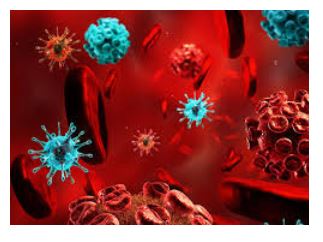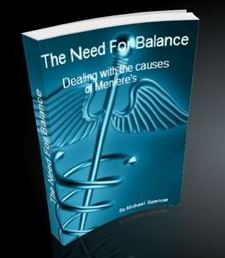Can Meniere’s Disease be caused by Autoimmunity?
Posted Under: General Information on Meniere's Disease / Syndrome,Meniere's Disease Triggers & Causes
By Mike Spencer
Founder of Meniere’s Help
Researcher and author of Managing Meniere’s Disease and The Need for Balance – Dealing with the Causes of Meniere’s
Table of Contents
Meniere’s Disease and Autoimmunity

Can Meniere’s Disease be caused by Autoimmunity? And if so what can you do about it?
In October 2014 a study paper on autoimmunity and Meniere’s was published from the University of South Florida: ‘Autoimmunity as a candidate for the epiopathogenesis of Meniere’s Disease’
The study concluded:
“The findings of this study suggest that autoimmunity could be one of the pathologic mechanisms behind Meniere’s disease. Multiple autoantibodies and antigens may be involved in the autoimmune reaction.
Specific antigens that caused immune reactions with patient’s serum in Protoarray analysis can be candidates for the diagnostic biomarkers of Meniere’s disease.
Further studies with mass screening using candidate antigen-antibody reactions are needed to identify future treatment modalities and to determine the true prevalence of autoimmune pathologic mechanisms underlying Meniere’s disease.”
For a long time autoimmunity was often overlooked as a possible cause of Meniere’s symptoms in some cases. That said, it seems in recent years there is more awareness both among treating doctors and many sufferers that this may be the case, at least in a significant number of people.
In a different study it has been claimed that 6% of patients with unilateral Meniere’s disease and 16% of patients with bilateral Meniere’s disease show signs of autoimmunity.
Are the symptoms of Meniere’s a result of an autoimmune response?
It is certainly a possibility to consider for at least some sufferers.
Have you been checked for this possibility?
If not, ask your doctor for a “Functional Immune System Evaluation” . You can present the studies linked from this blog as evidence that you need to be checked.
You may think that if only 6 – 16% of sufferers show signs of autoimmunity this doesn’t prove it is the definitive cause of your symptoms. Herein lies one of the problems in finding the causes of idiopathic conditions such as Meniere’s.
Tests and studies may focus on trying to find the causative factors when we now know without doubt that there are several root causes and it can be very different in each case. Therefore such studies will always have inconclusive results. Nevertheless these findings prove useful in creating a list of possible root causes to tackle in your own particular case.
There is no one size fits all with Meniere’s and nothing is written in stone, but with knowledge and a process of elimination you can find your cause or causes and deal with them. Autoimmune factors should be on your list of possibilities to consider.
This may well lead you to other factors that are causing autoimmunity and therefore the symptoms of Meniere’s. These causes may seem to have no obvious link to Meniere’s unless you are aware of how everything is connected and how the knock on effect can mean the resulting symptoms may, at first glance, seem far removed from the initial problem.
What causes autoimmunity in Meniere’s sufferers?
Autoimmune diseases refer to problems with the acquired immune system’s reactions. In an autoimmune reaction, antibodies and immune cells target the body’s own healthy tissues by mistake and attack them. This is part of the reason irregular T-cell activity is also a suspected cause. In both cases, this has to be a result of something else triggering this response, something else at root cause making the immune system act in such a way.
When unwelcome material or an ‘intruder’ invades your body your immune system protects you. It tries to identify, kill and eliminate these unwelcome invaders . But sometimes problems with your immune system cause it to mistake your body’s own healthy cells as invaders and then repeatedly attacks them. This is called an autoimmune disease. (‘Autoimmune’ literally means immunity against the self.)
The classic sign of an autoimmune disease is inflammation or swelling. How an autoimmune disease affects you depends on what part of the body is targeted. If your immune system is attacking your inner ear then the resulting swelling is causing the symptoms you feel.
For you the sufferer, it is a matter identifying the cause or causes in your individual case and correcting it or eliminating it from your life. (see below). It is generally accepted that it is unknown what causes autoimmune diseases.
In most cases, a combination of factors is probably at work. For example, you might have a genetic predisposition to develop a disease and then, under the right conditions, an outside invader like a virus might trigger it. Below you will read how the gut is the vital link to all of this and what you can do to correct it.
Regardless, you can re-balance your immune system naturally by getting to the root cause of the autoimmune response that is ultimately resulting in your Meniere’s symptoms. Drugs are aimed at suppressing your immune response and this can result in all kinds of side effects and more poor health.
Medical doctor and New York best seller with her book ‘The Thyroid Connection’ Amy Myers, herself a ‘former‘ sufferer of autoimmune disease, generally agrees with the above statement. She says,
“There is a huge disconnect between what actually causes autoimmunity and how conventional medicine treats it. The first thing to understand about autoimmune diseases is that they are a disease of the immune system. No matter what part of your body is under siege, the culprit is your immune system. This means that in order to treat, prevent, and reverse autoimmune disease you’ll need to get your immune system back under control.
However, under our current medical system, autoimmune diseases are not recognized as diseases of the immune system as a whole. Instead they are treated as diseases of particular organs. If you have multiple autoimmune conditions, as many people do, you will see several different specialists, each of whom will likely prescribe a different medication. And, there is a good chance that none of these specialists will look at how to strengthen and support your immune system, which leads me to my next point.
In conventional medicine, the belief is that once you have an autoimmune condition, there’s nothing you can do to reverse it, only ways to manage the symptoms. While medications can be effective at reducing some of the symptoms of the disease, since they suppress the entire immune system.
In contrast, functional medicine sees the body as a whole and works on the principle that the health of one system impacts the health and function of the others. Instead of focusing on disease symptom management, we focus on supporting and strengthening the immune system by getting to the root of why the immune system went rogue in the first place.
I have been able to successfully help hundreds of patients lower and reverse antibodies, get off their harsh medications, and become symptom free.”
Doctor Myers believes there are 5 underlying causes of autoimmune disease. All five of which can be linked to Meniere’s disease and are written about elsewhere on this website and discussed at length in the book The Need for Balance – Dealing with Causes of Meniere’s
- Leaky Gut 80% of your immune system originates in the gut, and you can’t have a healthy immune system without a healthy gut. See more on gut issues and Meniere’s disease here and here
- Gluten Gluten contributes to autoimmune disease in three key ways: it is the primary cause of leaky gut, it is highly inflammatory, meaning it stresses your immune system and the gluten protein has a similar chemical structure to some of your body’s tissues (specifically your thyroid). See more on gluten and Meniere’s from the two links above.
- Toxins Toxic molds (mycotoxins) and heavy metals such as mercury are the two main toxins Dr Myers sees in those with autoimmune conditions. You will see many articles on this blog and on the main website regarding toxins and Meniere’s. Read more on mercury and Meniere’s disease here and also in an article on thyroid and Meniere’s disease here.
- Infections There are now a number of infections, including Epstein Barr, Herpes Simplex 1 and 2, E. coli, that have been linked to autoimmune diseases.
- Stress Dr Myers says, “Levels of stress-related illnesses are on the rise, and stress, both of the emotional and the physical variety, has been shown to trigger and intensify autoimmune disorders. Stress disrupts immune function through several distinct pathways. Stress is the body’s response to a threat–a wound, injury, or infection. Chronic stress (the kind we face in this day and age) leads to long term inflammation that never really shuts off, creating autoimmune disease. Once the autoimmune response is in place, immediate stress only exacerbates it.” The links between stress and Meniere’s are well known and well documented on this site and in the book ‘The Need for Balance’.
All of the above are correctable.
Having spent many years hammering the fact on this website, in emails, conversations and having written two books on the subject, that getting to the root cause or causes of Meniere’s and correcting or eliminating that cause from your life can allow you to overcome this condition completely it is nice to have such a prominent health professional singing the same tune. It is all about “root causes“.
If you’re looking to calm down an overactive immune system that continually attacks healthy body tissue, then you must address the underlying causes for cellular inflammation. Ask your doctor about tests for hidden infections like yeast, viruses or Lyme disease. Have you been checked for any food allergies and heavy metal toxicity? You may be surprised at what you find.
As mentioned above when autoimmune factors are suspected, immune suppressing drugs are usually prescribed. Apart from the fact that suppressing the immune system can obviously lead to more poor health, many come with undesirable and even dangerous side effects.
The steroid Prednisone is often used in treating Meniere’s disease.
The possible known side effects of this drug is too extensive to list in this article. But among them are: dizziness, nausea, vomiting, headache and pounding in the ears. All of which would be totally counter to what the Meniere’s patient would want. A decrease in urine, another side effect, would also be the opposite of what the Meniere’s patient needs.
Other listed possible side effects of Prednisone that could be directly damaging to a Meniere’s sufferer are:
- Decreased carbohydrate and glucose tolerance
- Increased requirements for insulin
- Potassium loss
- Sodium retention with resulting edema
- Hypertriglyceridemia
- Hypercholesterolemia
- Adrenal insufficiency
- Hyperthyroidism
- Hypothyroidism
- Allergic reactions
- Candidiasis
- Sensory disturbance
- Anxiety
Prednisone is also what is known as a glucocorticoid because of the effects on glucose metabolism. Glucocorticoids can cause increases in blood glucose. Long term use of these steroids can result in type 2 diabetes. See more on Meniere’s and diabetes here.
Dr Myers talks about leaky gut being one of the main root causes of autoimmune disease. In this scenario, there is inflammation of the lining of the gut. This leads to a malabsorption of nutrients such as zinc, Vitamin B12, iron and magnesium. The immune system is triggered into a response. This can lead to gastrointestinal issues and many food intolerances and then autoimmune disease.
In this scenario things like gluten, bad bacteria, undigested food particles and toxic waste can leak from the inside of your intestinal wall into your bloodstream causing an immune reaction.
If this were to ultimately lead to Meniere’s symptoms then it could be said that the cause would be the inflammation within the gut. But beyond that, the inflammation in the gut has a root cause and that could be stress, toxins, drugs, pathogens or other organ malfunction.
The most common causes of leaky gut are thought to be poor diet, chronic stress, toxic overload and bacterial imbalance. All of which can be linked to Meniere’s disease.
To heal a leaky gut you would need to remove foods from your diet that damage the gut, replace them with healing foods and rebalance your gut bacteria with probiotics.
What to do about it
The immune system needs to be balanced and functioning as it should for you to be healthy and for it to deal with inflammation within your ear or anywhere else in your body. Detoxing, eating the correct food and supplementing with the appropriate quality supplements can strengthen and balance your immune system so it functions properly.
You may want to get your thyroid and endocrine system checked. These are two factors that are also often overlooked. Toxins in foods, drinks, beauty and skin care products and the environment are often major endocrine disruptors and estrogen mimickers that can play havoc with the body’s hormone system thus leading to dysfunctions and resulting in an autoimmune response.
Iodine deficiency is also a chronic problem according to many studies. All of these problems can have a knock on effect, weaken and cause imbalances in the immune system as a whole.
In May 2017 the WHO reported that, “Iodine deficiency is the world’s most prevalent, yet easily preventable, cause of brain damage. Universal salt iodization – the practice of adding iodine to salt – is the most cost effective way to tackle iodine deficiency disorders.”
There was a time when this iodine deficiency was recognized and iodine was added to table salt. Somewhere along the line iodine was inexplicably removed in the USA.
In countries such as Japan where iodine is plentiful naturally in the diet, they have much healthier citizens that enjoy the highest levels of longevity .
Iodine can be found in seaweed such as nori and kelp, pure natural unprocessed sea salt and in season, fresh organic cranberries. Supplementing with the purest form of Nascent Iodine has proved very beneficial to immune system function and overall health.
Autoimmunity is only one of several possible causes for you to get checked for and as stated above, can be a result in itself of a different root cause.
Among others, amalgam fillings that are leaking mercury into your body, TMJs, neck and spinal misaligments and metabolic problems are all things you should investigate and check off your list of possible causes.
All are fixable.
Just like Meniere’s itself, autoimmunity is another ‘health’ condition generally believed to have no known cause and no known cure. However, as you have read above this is not the case. Despite the fact that mainstream medicine is usually of this ‘opinion’, it is simply a case of awareness. The more you are aware, the more you know, the easier it becomes to seek out the right medical professionals and make the right lifestyle choices.
The book ‘Managing Meniere’s Disease – How to Live Symptom Free’ gives comprehensive details on how to suppress the symptoms through nutrition and allow your immune system to function as it should, how to avoid triggers and other factors that may be contributing to your condition. The Need for Balance – Dealing with the Cause of Meniere’s is a much more in depth look at all the possible root causes, how to identify them and eliminate them from your life, giving you the opportunity to overcome Meniere’s completely.
It is a message we repeat ad nauseam on Menieres Help: “It can be done, has been done by thousands and is being done all time.” Unfortunately, it may take a quantum shift in attitudes towards Meniere’s among many treating health professionals and patients alike before we see overcoming Meniere’s as the norm. For now I will have to keep hammering away and making baby steps with the undeniable truth, and that is: You CAN overcome Meniere’s and get your life back.
If you found this article useful Click here to support Meniere’s Help paypal.me/menieres
Related articles:
Help other Meniere’s sufferers. Have you been told your Meniere’s is due to autoimmune disorder? email Mike at meniereshelp@gmail.com or tell us all about it in the comment boxes below
References/Further reading:
https://pubmed.ncbi.nlm.nih.gov/28784462/







